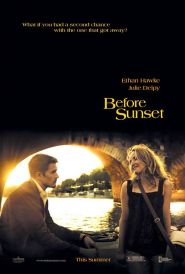
Hi all, it’s Tim, here on the eve of what is, by far, my most-anticipated summer release of 2013. Not, shockingly, The Hangover, Part III. Not even Epic. No, like most right-thinking people, 2013 for me is all about Before Midnight, the third film in one of cinema’s most unlikely series, in which we revisit lovers Celine (Julie Delpy) and Jesse (Ethan Hawke) every nine years to see what they’ve been up to. The first time we met them in Before Sunrise, they met by accident on a train into Vienna, then in Before Sunset they had an afternoon to walk around Paris, and in this third entry- I have no idea, I’m on completely spoiler lockdown with this film, to the level where I won’t even look at the poster. But I’m willing to guarantee that whatever they’re up to, it’s going to have some very deep resonance and profound truth to speak about the lifespan of romantic relationships.
For the benefit of anyone who hasn’t had the chance to see the earlier movies yet – please change that as soon as possible, I beg you – or to get series veterans riled up for its imminent return (like that’s even necessary), I wanted to share five reasons that, for me, the first two Before… movies are some of the finest romantic dramas in the history of cinema. [more...]
The characters are real, and precise.
Unless you’re paying attention to the cover of Jesse’s book in one scene of Sunset, neither of these characters have a last name, which is almost always fiction-code for “they are Everyperson stand-ins for the human experience”, and typically means that they’ll be a bit foggy in the expression. Nothing could be less true of either Celine or Jesse, both of whom are built with a basketful of specific character traits, whether it’s their fully fleshed-out back stories and current activities (e.g. Celine’s fond relationship with her grandmother and political engagement), or behavior that happens so naturally it doesn’t even seem like acting (e.g. Jesse’s habit of backtracking with a giggle every time he says something that Celine disapproves of), or even something as simple as patterns of speaking (e.g. the idiosyncratic use of “officially” in both films). And, obviously enough, it’s because they’re so exact and specific that they’re so appealing and easy to relate to; any time a writer wants to create a blank, universal situation, all they really do is make character who seem vague; because Jesse and Celine are so impeccable in every detail, it’s easier to think of their situation as applicable to real people and not just a concept.
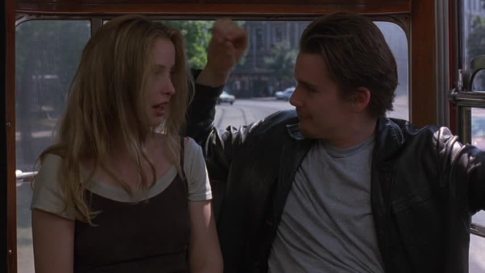
The characters aren’t idealized.
This is maybe contained within the last point, but important enough to pull it out on its own. If there’s one problem with modern romantic movies that makes all of them a bit tedious, it’s that the protagonists are too squeaky-clean, with their flaws depicted as charming quirks that anybody would love to be around, not irritations that a lover has to learn to understand and overlook. Celine and Jesse are, by and large, awfully pleasant and easy to like, but neither of them is a cardboard saint. Jesse is a bit preening and cocksure in Sunrise, after the fashion of every crisply-dressed jackass you wanted to punch in a bar, and he’s openly romanticizing the idea of cheating on his wife in Sunset. In both movies, Celine is intensely married to her opinions and takes obvious, if subdued delight in declaring those opinions loudly and forcefully enough that she makes her partner feel self-conscious and uncomfortable. They’re both prone to self-deception, and it’s pretty clear that they’re both a bit self-righteous. None of this is meant to make us dislike them, but it’s certainly enough to raise the question of whether they’d be a bit frustrating in real life. Of course they would, and it’s by allowing the romantic leads to have some dark shading that the films can suggest even more that they’re pretty realistic.
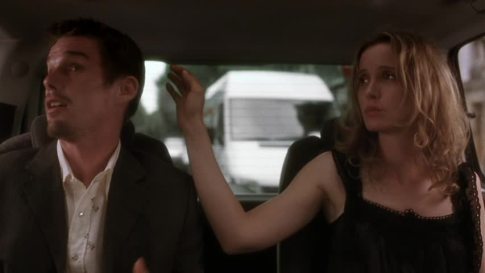
The films have a tremendous sense of place.
To a great degree, Sunrise is about knocking around Vienna, poking into corners and sightseeing, and doing it with somebody you have fun spending time with. And just as much, Sunset is about not paying any attention to the sights of Paris as you’re walking around with somebody that you need, desperately, to reconnect with. So the relationship each film has to the city it takes place is very different, yet both of them succeed in capturing something very important about the feeling and texture of that city: without ever once having to rely on postcard-friendly shots of buildings and landscapes, the films act as the best possible advertisements for the cities by depicting them as alive and moving, full of little details that add to the texture and depth of the films whether the protagonists are engaging with the city, or ignoring it.
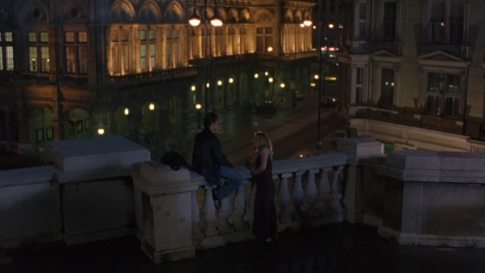
The craftsmanship is deliberate and precise without being overwhelming.
Richard Linklater has had his ups and downs as a director, but the Before films are pretty clearly his masterpieces. Not because you can see him working for it, though. In fact, the guiding hand behind the movies is so quiet as to be completely invisible, particularly in Sunset, which is made up almost entirely of two-shots facing the characters. This simplicity isn’t the same as carelessness, though; what Linklater’s camera does here is to strip out everything that would be a distraction from the characters and the actors. It’s not the same as “getting out of the way”, as we sometimes dismissively say of direction that bows down in favor of letting the actors go on in bland long takes (think of any of Woody Allen’s sub-par films); it’s clearing the way, using some awfully complex and ambitious tracking shots (in Sunset), or very carefully-framed shots (in both films) not to draw attention to the cinematography, but to draw attention to the characters. It’s invisible filmmaking without which the films wouldn’t have nearly the impact they do, for the randomness of just filming actors is nothing like the deliberate care of foregrounding the actors without being showy.
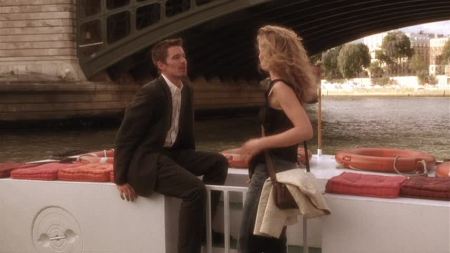
The movies leave us wanting more.
The ending of Sunrise, with Celine and Jesse romantically committing the kind of abject stupidity that could only be mistaken for wisdom by the young and intellectual. The exhilarating ellipsis as Sunset draws to a close with its legendary “Baby, you are gonna miss that plane” / “I know”. The films have so far performed the most dramatic kind of balancing act of convincing us of the emotions in the central relationship, and then refraining from paying that relationship off as most films would. Instead of being frustrating, this ends up being the most exciting and involving part of all, creating the sense that the characters have lives going on beyond the edges of the movie, and that makes our novennial reunions with these characters all the more inviting. I don’t know if Before Midnight will have a similar note of deliberate incompleteness in its closing moments, but based on the films so far, I expect to be just as invested in the lives of Celine and Jesse in 2022 as I am here in 2013.